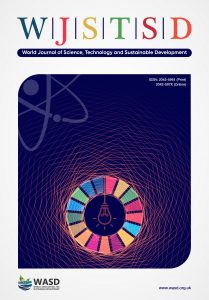Shadow economy, institutions and environmental pollution: insights from Africa, James Dada, Folorunsho Ajide and Akinwumi Sharimakin
 James Temitope Dada
James Temitope Dada
Department of Economics
Obafemi Awolowo University, Ile-Ife
Nigeria
Email: jamesdada@oauife.edu.ng/temitope2081@yahoo.com
Folorunsho Monsur Ajide
Department of Economics
University of Ilorin, Ilorin
Nigeria
Akinwumi Sharimakin
Department of Economics
Adeyemi College of Education, Ondo
Nigeria
DOI: 10.1108/WJSTSD-12-2020-0105
Purpose: This study investigates the effect of shadow economy on environmental pollution and the role of institutional quality in moderating the impact in African countries between 1991 and 2015.
Design/methodology/approach: The study employs three pollutant variables namely: carbon dioxide emissions per capita, methane emission and nitrous oxide emission as robustness check. Also, battery of methodologies; ordinary least squares, fixed effects and system generalised method of moments are used to drive out the conclusions of this study.
Findings: The findings reveal that shadow economy and institutional quality contribute significantly to environmental pollution in Africa. Further, the interactive effect of shadow economy and institutional quality worsens environmental quality in the region. This reveals that weak institutional quality recorded in the region increases the level of shadow economy, thereby intensifying environmental pollution.
Practical implications: The study concludes that weak institutional framework in the region reinforces shadow economy and environmental pollution. Hence, findings from this study can help policymakers in the region to better understand the role of institutional quality in reducing shadow economy and environmental pollution.
Originality/value: This study enriches one’s understanding on the role of institutional quality in the relationship between environmental quality and shadow economy in African context. It investigates the direct and indirect impact of institutions and shadow economy on environmental quality. The study also uses three different robust variables to measure environmental pollution (carbon dioxide (CO2) emissions per capita, methane emission and nitrous oxide emission) for sensitivity analysis.
Keywords: Environmental quality; Pollution; Shadow economy; Institutional quality; Africa; O17; P48; Q53.
Citation: Dada, J.T., Ajide, F.M. and Sharimakin, A. (2021), "Shadow economy, institutions and environmental pollution: insights from Africa", World Journal of Science, Technology and Sustainable Development, Vol. 18 No. 2, pp. 153-171. https://doi.org/10.1108/WJSTSD-12-2020-0105

